一般过去时的用法与练习(包括动词过去式变化)
- 格式:doc
- 大小:74.30 KB
- 文档页数:8
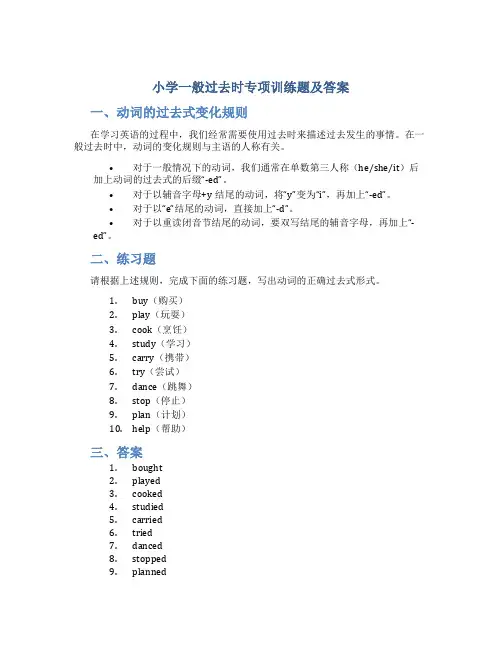
小学一般过去时专项训练题及答案一、动词的过去式变化规则在学习英语的过程中,我们经常需要使用过去时来描述过去发生的事情。
在一般过去时中,动词的变化规则与主语的人称有关。
•对于一般情况下的动词,我们通常在单数第三人称(he/she/it)后加上动词的过去式的后缀“-ed”。
•对于以辅音字母+y结尾的动词,将“y”变为“i”,再加上“-ed”。
•对于以“e”结尾的动词,直接加上“-d”。
•对于以重读闭音节结尾的动词,要双写结尾的辅音字母,再加上“-ed”。
二、练习题请根据上述规则,完成下面的练习题,写出动词的正确过去式形式。
1.buy(购买)2.play(玩耍)3.cook(烹饪)4.study(学习)5.carry(携带)6.try(尝试)7.dance(跳舞)8.stop(停止)9.plan(计划)10.help(帮助)三、答案1.bought2.played3.cooked4.studied5.carried6.tried7.danced8.stopped9.planned10.helped四、知识点总结通过以上练习题,我们了解了动词在一般过去时中的变化规则。
掌握这些规则对于正确使用过去时非常重要。
需要注意的是,一些不规则动词的过去式形式并不按照常规的规则来变换。
因此,在学习过程中,我们需要特别注意这些不规则动词,并进行针对性的练习和记忆。
希望以上的练习题对于小学生来说能够帮助加深对一般过去时的理解,提高正确使用过去时的能力。
祝大家学习进步!。
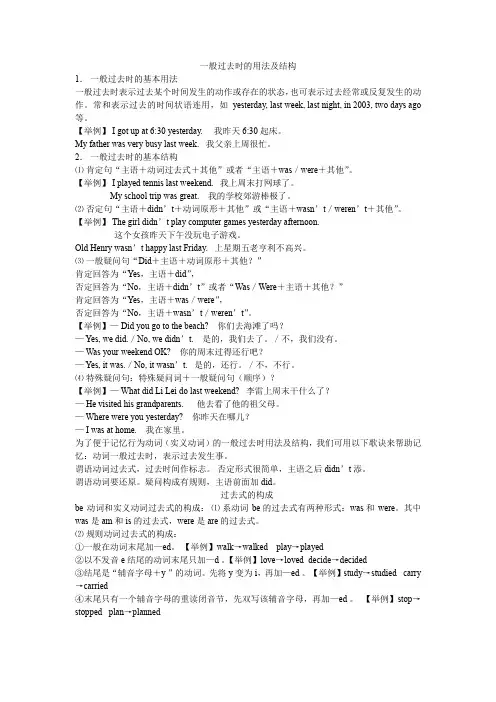
一般过去时的用法及结构1.一般过去时的基本用法一般过去时表示过去某个时间发生的动作或存在的状态,也可表示过去经常或反复发生的动作。
常和表示过去的时间状语连用,如yesterday, last week, last night, in 2003, two days ago 等。
【举例】 I got up at 6:30 yesterday. 我昨天6:30起床。
My father was very busy last week. 我父亲上周很忙。
2.一般过去时的基本结构⑴肯定句“主语+动词过去式+其他”或者“主语+was/were+其他”。
【举例】 I played tennis last weekend. 我上周末打网球了。
My school trip was great. 我的学校郊游棒极了。
⑵否定句“主语+didn’t+动词原形+其他”或“主语+wasn’t/weren’t+其他”。
【举例】 The girl didn’t play computer games yesterday afternoon.这个女孩昨天下午没玩电子游戏。
Old Henry wasn’t happy last Friday. 上星期五老亨利不高兴。
⑶一般疑问句“Did+主语+动词原形+其他?”肯定回答为“Yes,主语+did”,否定回答为“No,主语+didn’t”或者“Was/Were+主语+其他?”肯定回答为“Yes,主语+was/were”,否定回答为“No,主语+wasn’t/weren’t”。
【举例】— Did you go to the beach? 你们去海滩了吗?— Yes, we did./No, we didn’t. 是的,我们去了。
/不,我们没有。
— Was your weekend OK? 你的周末过得还行吧?— Yes, it was./No, it wasn’t. 是的,还行。
/不,不行。
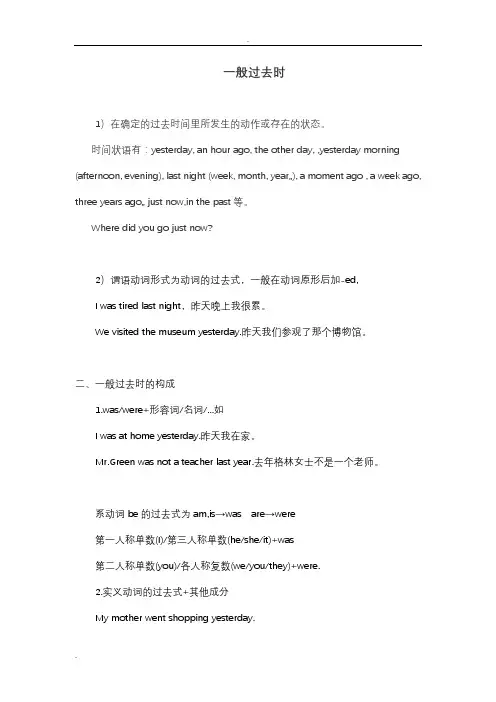
一般过去时1)在确定的过去时间里所发生的动作或存在的状态。
时间状语有:yesterday, an hour ago, the other day, ,yesterday morning (afternoon, evening), last night (week, month, year…), a moment ago , a week ago, three years ago… just now,in the past等。
Where did you go just now?2)谓语动词形式为动词的过去式,一般在动词原形后加-ed,I was tired last night,昨天晚上我很累。
We visited the museum yesterday.昨天我们参观了那个博物馆。
二、一般过去时的构成1.was/were+形容词/名词/...如I was at home yesterday.昨天我在家。
Mr.Green was not a teacher last year.去年格林女士不是一个老师。
系动词be的过去式为am,is→was are→were第一人称单数(I)/第三人称单数(he/she/it)+was第二人称单数(you)/各人称复数(we/you/they)+were.2.实义动词的过去式+其他成分My mother went shopping yesterday.我妈妈昨天去购物了。
His uncle worked in Beijing in 2014.他叔叔2014年在北京工作。
三、一般过去时的句式四、动词过去式的变化规则3 used toused to + do:"过去常常"表示过去习惯性的动作或状态,但如今已不存在。
Mother used to take a walk. (过去常常散步)二、构成及变化1. Be动词在一般过去时中的变化:am 和is在一般过去时中变为was。
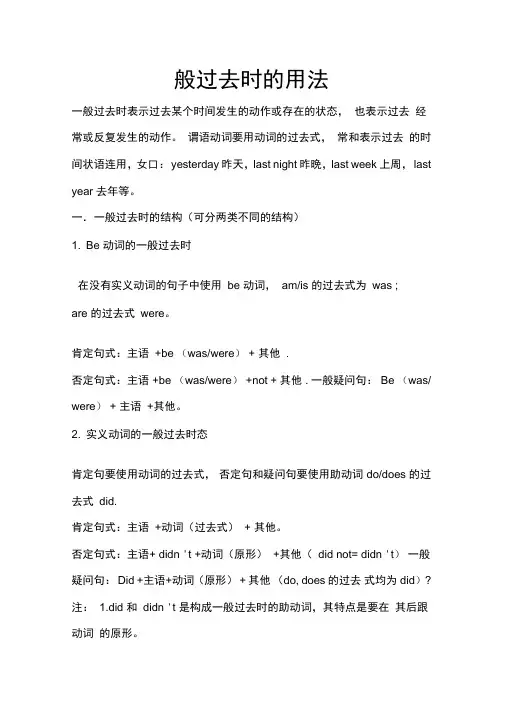
般过去时的用法一般过去时表示过去某个时间发生的动作或存在的状态,也表示过去经常或反复发生的动作。
谓语动词要用动词的过去式,常和表示过去的时间状语连用,女口:yesterday 昨天,last night 昨晚,last week 上周,last year 去年等。
一.一般过去时的结构(可分两类不同的结构)1. Be 动词的一般过去时在没有实义动词的句子中使用be 动词,am/is 的过去式为was ;are 的过去式were。
肯定句式:主语+be (was/were) + 其他.否定句式:主语+be (was/were) +not + 其他. 一般疑问句:Be (was/ were) + 主语+其他。
2. 实义动词的一般过去时态肯定句要使用动词的过去式,否定句和疑问句要使用助动词do/does 的过去式did.肯定句式:主语+动词(过去式)+ 其他。
否定句式:主语+ didn 't +动词(原形)+其他(did not= didn 't)一般疑问句:Did +主语+动词(原形)+ 其他(do, does 的过去式均为did)? 注: 1.did 和didn 't 是构成一般过去时的助动词,其特点是要在其后跟动词的原形。
2. 实义动词do 的一般过去时,例:Jim went home yesterday. --- Jim didn ' t go home yesterday.(否定句)--- Did Jim go home yesterday?(一般疑问句)--- What did Jim do yesterday?(特殊疑问句)二.一般过去时的判断标志词:yesterday,the day before yesterday,last+ 时间,this morning, 时间+ago,just now,a moment ago,in+ 过去的时间注意:一般过去时表示过去经常或反复发生的动作,常和often 经常,always ,总是,once a week 一周一次,等表示频度的时间状语连用动词过去式变化规则:1. 一般在动词末尾加ed, 如:pull--pulled, cook--cooked, play--played2. 结尾是e 力口d,女口: taste--tasted, live--lived, use--used3. 末尾是辅音字母加一个元音字母的重读闭音节,应双写末尾的辅音字母,再力口ed,女口:stop-stopped, plan--planned4. 以“辅音字母+y ”结尾的,变y为i,再加ed,如:study-studied5. 不规则动词过去式:(见课后)过去时练习选择( ) 1.What __________ they ____________ dinner yesterday?D.wanted; buyA.do; have forB.did; had for;C. LeavedD.was leaving( )2.Could you tell me what time _______________ t he plane?A.leftB.leavesC.leavedD.left( )3.One of us ______________ band last month.A. leavesB. leaveC.leavedD. left( )4.Where _______________ your mother born?A.areB. wasC.wereD.is ( )5.Do you know why he _______________ for class last year?A.was always lateB.always was lateC.is late alwaysD.is always late( )6.I got up _______________ this morning. So I ________ breakfast and went to school.te, didn 't haveB. Early, didn 't havete, hadn ' tD.early, hadn 't( )7.It ______________ much cold today than it ___________ yesterday.A.is, isB.was, wasC.is, wasD.was, is ( )8.He didn ' t come __________ goodbye to us and ________ away.A.say,goB.say, wentC.to say, wentD.to say, go( )9.Her pen was broken.She ________ to _______ a new one.A.wants, buysB.wanted, boughtC.wants,bought ( )10.I thought the dress ________ really pretty.A.isB. wasC./D.were( )11.I ______________ tired now, but it __________ an exciting day.A.am, wasB.was,wasC.was,isD.am,is( )12.He said he ____________ go to cook dinner for us.A.willB.wouldC./D.doesn ' t( )13.I stayed in the sitting room and _________ my friends all the time.A.talk toB.talkedC.talk aboutD.talked to( )14.She also __________ her _____ in a 1990s style.A.weared;hairB.wore;hairC.wear;hairD.wears;hairs( )15.I went to see you last Saturday, ________ t here _____ nobody inthe room.A. but;wasB.and;wereC.and;wasD.but;is二、用所给词的适当形式填空1. He put the books away and ________ (go)home.2. The boy is running and ________ (tie)his shoes on the playground.3. My father ________ (buy) a new computer for _________ (I)yesterday.4. He often ___________ (go)to school by bike,but last year heoften ___ (walk)to school.5. After she finished _________ (pack )everything,she ______________ (go)to school.6. ----Who ____ (wash)the plates on the table?----Jenny did.7. ----When ___ you _____ (see)the film “ Titanic ” ?8. It' s half past eleven now.Jim ____ (have)lunch.He usually ____ (have)itat this time.9. She _______ (write)to Jill last month.She __________ (write) to him nexttime.10. The students _____ (stop)talking when their teacher came up.三、句型转换1. The children had a good time in the park.否定句:____________________________________________________一般疑问句:________________________________________________________对划线部分提问:________________________________________________________ 2. There were about nine hundred people at the concert.( _____ 音乐会)对划线部分提问:________________________________________________________ 一般疑问句:________________________________________________________否定句:____________________________________________________3. There was only one problem.否定句:____________________________________________________一般疑问句:________________________________________________________肯定/否定回答:_________________________________________________________ 4. A nn did her homework yesterday eve ning.否定句:____________________________________________________一般疑问句:________________________________________________________对划线部分提问:________________________________________________________ 5. Last week I read an English book.否定句:____________________________________________________一般疑问句:________________________________________________________肯定/否定回答:_________________________________________________________ 对划线部分提问:________________________________________________________2. Frank read an interesting book about history._________ Frank ___________ an in terest ing book about history?3. He' s cleaning his rooms.____________ he ________________ ?4. Why not go out for a walk?__________ _________ __________ ___________ out for a walk? 5. Thomas spent RMB 10 on this book.Thomas __________ __________ RMB 10 on this book.6. My family went to the beach last week.___________ ___________ ___________ family ________ last week?7.I didn ' t have any friends.___________ __________ have ___________ friends?8.I think she is Lily 's sister.9. Sally often does some reading in the morning.Sally _________ often _________ some reading in the morning.10.He is a tall boy._________ _________ he __________ __________ ?六.翻译下列句子1.我过了一个忙碌却又刺激的周末。
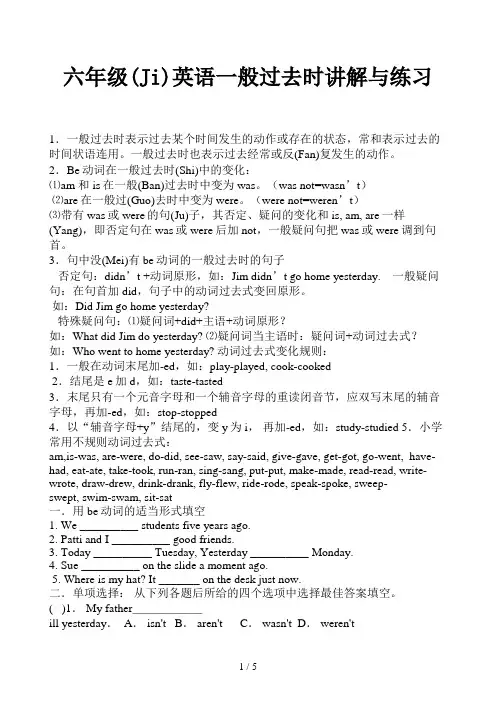
六年级(Ji)英语一般过去时讲解与练习1.一般过去时表示过去某个时间发生的动作或存在的状态,常和表示过去的时间状语连用。
一般过去时也表示过去经常或反(Fan)复发生的动作。
2.Be动词在一般过去时(Shi)中的变化:⑴am 和is在一般(Ban)过去时中变为was。
(was not=wasn’t)⑵are在一般过(Guo)去时中变为were。
(were not=weren’t)⑶带有was或were的句(Ju)子,其否定、疑问的变化和is, am, are一样(Yang),即否定句在was或were后加not,一般疑问句把was或were调到句首。
3.句中没(Mei)有be动词的一般过去时的句子否定句:didn’t +动词原形,如:Jim didn’t go home yesterday. 一般疑问句:在句首加did,句子中的动词过去式变回原形。
如:Did Jim go home yesterday?特殊疑问句:⑴疑问词+did+主语+动词原形?如:What did Jim do yesterday? ⑵疑问词当主语时:疑问词+动词过去式?如:Who went to home yesterday? 动词过去式变化规则:1.一般在动词末尾加-ed,如:play-played, cook-cooked2.结尾是e加d,如:taste-tasted3.末尾只有一个元音字母和一个辅音字母的重读闭音节,应双写末尾的辅音字母,再加-ed,如:stop-stopped4.以“辅音字母+y”结尾的,变y为i,再加-ed,如:study-studied 5.小学常用不规则动词过去式:am,is-was, are-were, do-did, see-saw, say-said, give-gave, get-got, go-went, have-had, eat-ate, take-took, run-ran, sing-sang, put-put, make-made, read-read, write-wrote, draw-drew, drink-drank, fly-flew, ride-rode, speak-spoke, sweep-swept, swim-swam, sit-sat一.用be动词的适当形式填空1. We __________ students five years ago.2. Patti and I __________ good friends.3. Today __________ Tuesday, Yesterday __________ Monday.4. Sue __________ on the slide a moment ago.5. Where is my hat? It _______ on the desk just now.二.单项选择:从下列各题后所给的四个选项中选择最佳答案填空。
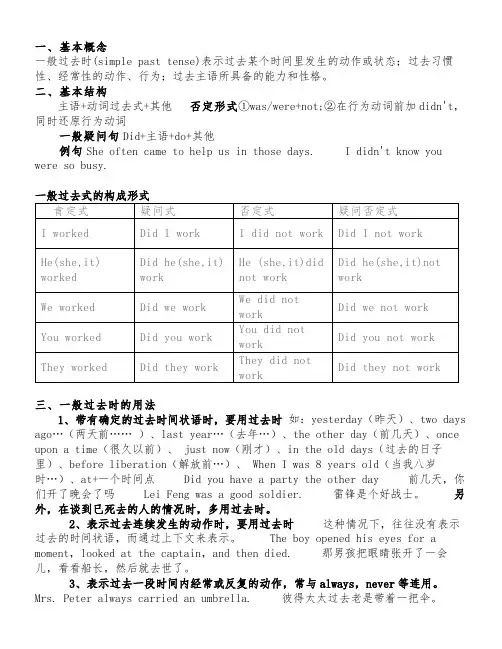
一、基本概念一般过去时(simple past tense)表示过去某个时间里发生的动作或状态;过去习惯性、经常性的动作、行为;过去主语所具备的能力和性格。
二、基本结构主语+动词过去式+其他否定形式①was/were+not;②在行为动词前加didn't,同时还原行为动词一般疑问句Did+主语+do+其他例句She often came to help us in those days. I didn't know you were so busy.ago…(两天前……)、last year…(去年…)、the other day(前几天)、once upon a time(很久以前)、 just now(刚才)、in the old days(过去的日子里)、before liberation(解放前…)、 When I was 8 years old(当我八岁时…)、at+一个时间点Did you have a party the other day 前几天,你们开了晚会了吗Lei Feng was a good soldier. 雷锋是个好战士。
另外,在谈到已死去的人的情况时,多用过去时。
2、表示过去连续发生的动作时,要用过去时这种情况下,往往没有表示过去的时间状语,而通过上下文来表示。
The boy opened his eyes for a moment,looked at the captain,and then died. 那男孩把眼睛张开了一会儿,看看船长,然后就去世了。
3、表示过去一段时间内经常或反复的动作,常与always,never等连用。
Mrs. Peter always carried an umbrella. 彼得太太过去老是带着一把伞。
(只是说明她过去的动作,不表明她现在是否常带着伞。
)比较Mrs.Peter always carries an umbrella. 彼得太太老是带着伞。
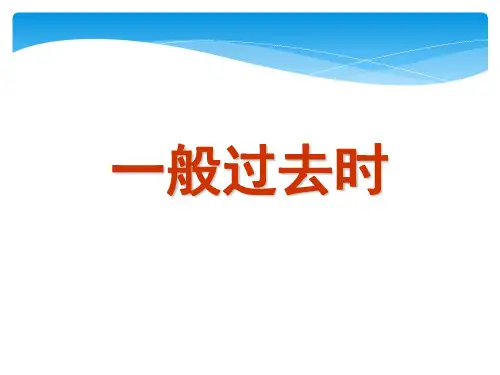
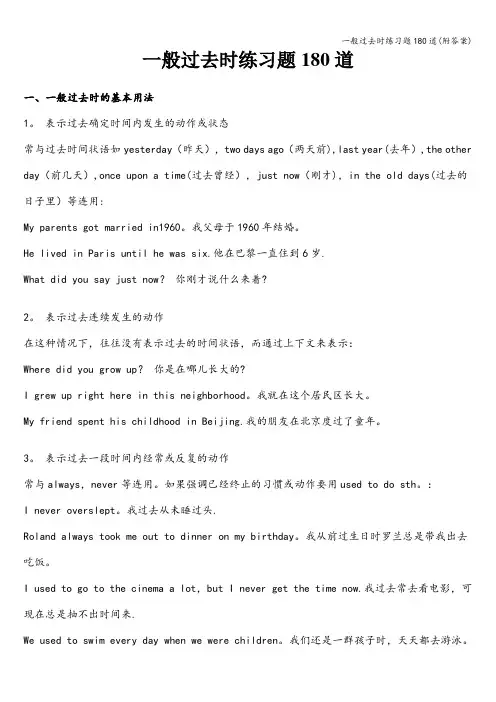
一般过去时练习题180道一、一般过去时的基本用法1。
表示过去确定时间内发生的动作或状态常与过去时间状语如yesterday(昨天),two days ago(两天前),last year(去年),the other day(前几天),once upon a time(过去曾经),just now(刚才),in the old days(过去的日子里)等连用:My parents got married in1960。
我父母于1960年结婚。
He lived in Paris until he was six.他在巴黎一直住到6岁.What did you say just now?你刚才说什么来着?2。
表示过去连续发生的动作在这种情况下,往往没有表示过去的时间状语,而通过上下文来表示:Where did you grow up?你是在哪儿长大的?I grew up right here in this neighborhood。
我就在这个居民区长大。
My friend spent his childhood in Beijing.我的朋友在北京度过了童年。
3。
表示过去一段时间内经常或反复的动作常与always,never等连用。
如果强调已经终止的习惯或动作要用used to do sth。
:I never overslept。
我过去从未睡过头.Roland always took me out to dinner on my birthday。
我从前过生日时罗兰总是带我出去吃饭。
I used to go to the cinema a lot,but I never get the time now.我过去常去看电影,可现在总是抽不出时间来.We used to swim every day when we were children。
我们还是一群孩子时,天天都去游泳。
有些句子,虽然没有表示过去确定时间的状语,但实际上是指过去发生的动作或状态:I thought it was true。
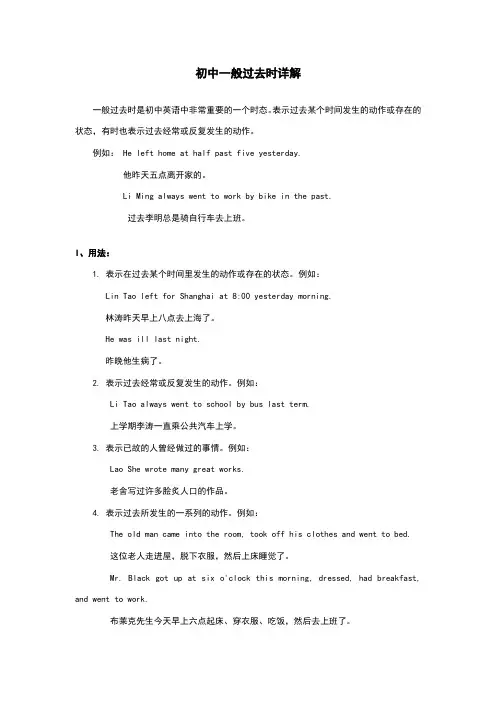
初中一般过去时详解一般过去时是初中英语中非常重要的一个时态。
表示过去某个时间发生的动作或存在的状态,有时也表示过去经常或反复发生的动作。
例如: He left home at half past five yesterday.他昨天五点离开家的。
Li Ming always went to work by bike in the past.过去李明总是骑自行车去上班。
I、用法:1. 表示在过去某个时间里发生的动作或存在的状态。
例如:Lin Tao left for Shanghai at 8:00 yesterday morning.林涛昨天早上八点去上海了。
He was ill last night.昨晚他生病了。
2. 表示过去经常或反复发生的动作。
例如:Li Tao always went to school by bus last term.上学期李涛一直乘公共汽车上学。
3. 表示已故的人曾经做过的事情。
例如:Lao She wrote many great works.老舍写过许多脍炙人口的作品。
4. 表示过去所发生的一系列的动作。
例如:The old man came into the room, took off his clothes and went to bed.这位老人走进屋,脱下衣服,然后上床睡觉了。
Mr. Black got up at six o'clock this morning, dressed, had breakfast, and went to work.布莱克先生今天早上六点起床、穿衣服、吃饭,然后去上班了。
II、一般过去时如何识别?每个时态,都会有其独特的标志性词语(主要是时间状语)。
可以称其为“标志词”。
通常来讲,一般过去时常见的标志词有:1. yesterday, the day before yesterday.2. last week / year / month / term…(简称last系列)3. two hours ago, three years ago, a moment ago…(简称ago系列)4. in / on + 过去的年/月/日,如 in 1999, in April, 20055. just now, once upon a time, one day…III、分类:1. 含有be动词的一般过去时:系动词be的过去式有两种形式:was和were。
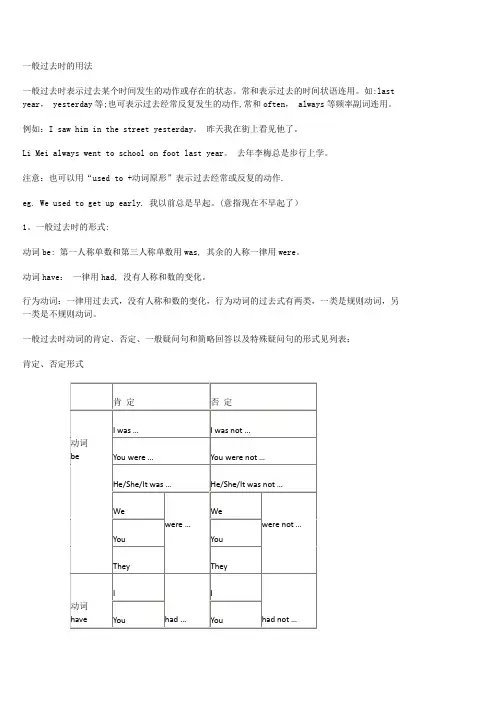
一般过去时的用法一般过去时表示过去某个时间发生的动作或存在的状态。
常和表示过去的时间状语连用。
如:last year, yesterday等;也可表示过去经常反复发生的动作,常和often, always等频率副词连用。
例如:I saw him in the street yesterday。
昨天我在街上看见他了。
Li Mei always went to school on foot last year。
去年李梅总是步行上学。
注意:也可以用“used to +动词原形”表示过去经常或反复的动作.eg. We used to get up early. 我以前总是早起。
(意指现在不早起了)1。
一般过去时的形式:动词be: 第一人称单数和第三人称单数用was, 其余的人称一律用were。
动词have:一律用had, 没有人称和数的变化。
行为动词:一律用过去式,没有人称和数的变化,行为动词的过去式有两类,一类是规则动词,另一类是不规则动词。
一般过去时动词的肯定、否定、一般疑问句和简略回答以及特殊疑问句的形式见列表:肯定、否定形式行为动词的过去时的否定式,要使用助动词 do 的过去式did,后面的谓语动词要还原为原形。
注意:在非正式语如口语中,was not, were not, had not和did not 可以分别缩写成wasn’t,weren’t,hadn’t和didn't。
一般疑问句和简略回答特殊疑问句和简略回答)2。
一般过去时的几种句型(这里只讲行为动词)肯定句结构为:主语+动词的过去式+其他。
如:He went to the toy store yesterday。
他昨天去玩具店了。
否定句结构为:主语+did not (didn’t)+动词原形+其他。
如:He didn’t go to the toy store yesterday. 他昨天没去玩具店。
一般疑问句的构成:Did+主语+动词原形+其他?如:1) -Did you go to Beijing last week?-Yes, we did。
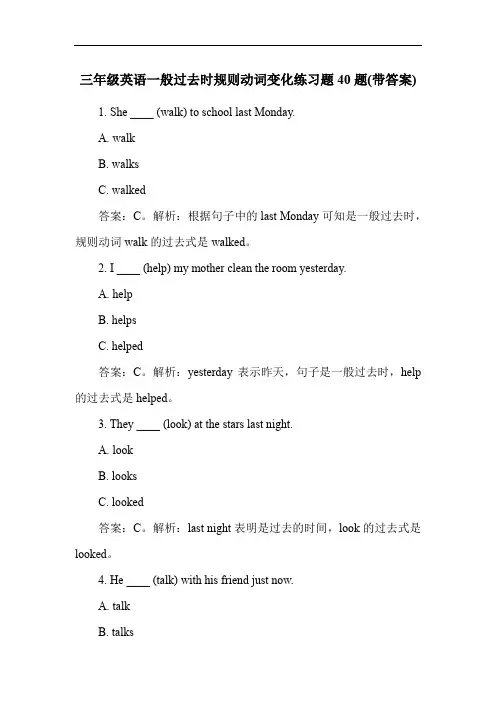
三年级英语一般过去时规则动词变化练习题40题(带答案)1. She ____ (walk) to school last Monday.A. walkB. walksC. walked答案:C。
解析:根据句子中的last Monday可知是一般过去时,规则动词walk的过去式是walked。
2. I ____ (help) my mother clean the room yesterday.A. helpB. helpsC. helped答案:C。
解析:yesterday表示昨天,句子是一般过去时,help 的过去式是helped。
3. They ____ (look) at the stars last night.A. lookB. looksC. looked答案:C。
解析:last night表明是过去的时间,look的过去式是looked。
4. He ____ (talk) with his friend just now.A. talkB. talks答案:C。
解析:just now是刚才的意思,句子用一般过去时,talk 的过去式是talked。
5. We ____ (like) the movie last weekend.A. likeB. likesC. liked答案:C。
解析:last weekend表示上周末,一般过去时,like的过去式是liked。
6. My sister ____ (paint) a picture two days ago.A. paintB. paintsC. painted答案:C。
解析:two days ago是两天前,一般过去时,paint的过去式是painted。
7. The boy ____ (jump) high last week.A. jumpB. jumpsC. jumped答案:C。
解析:last week上周,一般过去时,jump的过去式是jumped。
一、一般去的定一般去表示去某一候或某一段所生了的事情或存在的状。
常与去 yesterday,thismorning,justnow,amomentago,inMay,last night/year/week,onceuponatime,theotherday,beforeclause,in⋯the,when –past用。
如:Whatdidyoudoyesterday?昨天你干了什么?ImetLinTaothismorning.今日上午我会到了林涛。
Iwasthereamomentago. 才我在那边二、用法明1表示在去某个所生的作或所的状。
常与yesterday,lastweek,in1989,justnow,amomentago,theotherday等用。
如:Hewasherejustnow.他才在里。
Whatdidyoudoyesterday?你昨天做了什么事?在去一段内的常性或性作。
如:Weoftenplayedtogetherwhenwewerechildren.我小候常在一同玩。
注:表示去常生的作可用usedto如:Heusedtosmokealot,buthedoesn和would。
’他tnow去.常吸烟,但在不抽了。
Wheneverwewereintrouble,hewouldhelpus.每当我碰到困,他都会帮助我。
表示主去的特点或性格。
如:AtthattimeshewasverygoodatEnglish.那她英学得很好。
用在状从句中表示去未来。
如:Hesaidhewouldwaituntiltheycameback.5一般去有能够表示在,多与want,hope,wonder,think,intend等用,负气更委宛。
如:Iwonderedifyoucouldhelpme.不知你能不可以帮我一下。
实用一般去也是一致的需要。
如:Ididn’tknowyouwerehere没.想到你在里。
英语基础语法:一般过去时一一般过去时的定义一般过去时表示过去某一时候或某一段时间所发生了的事情或存在的状态。
常与过去时间yesterday, this morning, just now, a moment ago, in May, last night / year / week, once upon a time, the other day, before …, when –clause, in the past连用。
如:What did you do yesterday? 昨天你干了什么?I met Lin Tao this morning. 今天上午我会到了林涛。
I was there a moment ago. 刚才我在那儿二、用法说明1表示在过去某个时间所发生的动作或所处的状态。
常与yesterday, last week, in 1989, just now, a moment ago, the other day等连用。
如:He was here just now. 他刚才还在这里。
What did you do yesterday? 你昨天做了什么事?2在过去一段时间内的经常性或习惯性动作。
如:We often played together when we were children. 我们小时候常在一起玩。
注:表示过去经常发生的动作还可用used to 和would。
如:He used to smoke a lot, but he doesn’t now. 他过去经常抽烟,但现在不抽了。
Whenever we were in trouble, he would help us. 每当我们遇到困难,他都会帮助我们。
3表示主语过去的特征或性格。
如:At that time she was very good at English. 那时她英语学得很好。
4用在状语从句中表示过去将来。
动词的一般过去时与过去式结构和用法
一般过去时的用法包括:
1. 表示过去的动作或事件:I played soccer yesterday.(昨天我
踢足球。
)
2. 表示过去的习惯动作:She always ate breakfast at 7 o'clock.(她过去总是7点吃早饭。
)
3. 表示过去的状态:They were tired after the long journey.(长途旅行后,他们感到疲倦。
)
4. 用于虚拟语气中:If I had more money, I would buy a new car.(如果我有更多的钱,我会买一辆新车。
需要注意的是,一般过去时在各种人称和数上的变化是一致的,只是在第三人称单数上需要加-s或-es(如he/she/it plays → he/she/it played)。
有些不规则动词在过去式中变化不规则,需要进行记忆(如
go → went,have → had)。
总结来说,一般过去时是用来表示过去发生的动作、习惯、状态和虚拟语气的,其结构为动词的过去式,变化规则一致。
文新学堂-----您值得信赖的专业化个性化辅导学校 个 性 化 辅 导 方 案
教师: 张明 学生: 日期: 星期:
课题 一般过去时
学情分析 要掌握一般过去时的用法,注意在句型变换中的用法
教学目标与 考点分析 了解其用法
掌握其应用 教学重点 难点 与现在完成时的比较
教学方法 说练结合
教学过程 一般过去时 一、 构成 动词变为它的过去式 二、 常用的时间状语 yesterday/yesterday morning/last night/a month ago/in 2000/just now/one day before 三、 动词的过去式 1、 规则变化 一般在动词末尾加ed: look-looked 以e结尾加d: move-moved 重读闭音节结尾双写尾字母加ed: stop-stopped 辅音字母加y结尾变y为i加ed: study-studied 文新学堂-----您值得信赖的专业化个性化辅导学校 元音字母加y结尾直接加ed: play-played
2. 不规则变化 a. 把动词原形中的i改为a: begin—began,drink—drank,give—gave,ring—rang, sing—sang,sit—sat,swim—swam b.把重读开音节中的i改为o: drive—drove,ride—rode,write—wrote c.改动词原形中的aw /ow为ew: draw—drew,grow—grew,know—knew,throw—threw (动词show除外,show—showed) d.动词原形中的e改为o: get—got,forget—forgot e.动词原形中的ee改为e: feed—fed,meet—met f.动词原形中的eep改为ept: keep—kept,sleep—slept,sweep—swept g.动词原形中的eak改为oke: break—broke,speak—spoke h.动词原形中的ell改为old: sell—sold,tell—told i.动词原形中的an改为oo: stand—stood,understand—understood j.以ought和aught结尾,且读音是〔 :t〕的过去式: 文新学堂-----您值得信赖的专业化个性化辅导学校 bring—brought,buy— bought,think—thought,catch—caught
Grammar一般过去时:(simple past tense)●一般过去时:表示过去发生的动作或存在的状态●通常句子中有表示过去的时间词: yesterday 昨天、just now刚才、last night 昨晚、last week 上周、last year 去年、last month 上个月、the day before yesterday 前天●肯定句动词要用过去式:(did)●My uncle gave the kitten to me yesterday. (give ----- gave )●变否定句用 didn't 动词恢复原形;●My uncle didn't give the kitten to me yesterday.●变一般疑问句用 Did,动词恢复原形,加问号。
●Did your uncle give the kitten to you yesterday?●Yes, he did. / No, he didn't幻灯片16●变特殊疑问句(划线提问)用疑问词+did,动词恢复原形,加问号,去掉划线部分。
●When did your uncle give the kitten to you?●Be动词在一般过去时用was或were●It was sunny yesterday.●变一般疑问句:Be提到句首,加问号;变否定句:be+not;变特殊疑问句(也叫划线提问):疑问词+be+其他+?●Was it sunny yesterday?●Yes, it was. No, it wasn’t.●It wasn’t sunny yesterday.●When was it sunny ?幻灯片17●some变否定句或疑问句变为any;I was 或 We were 变疑问句改为 Were you....; my 或 our改为 your。
●We were pupils.(一般疑问,否定,划线)●Were you pupils?●Yes, we were. No, we weren’t.●We weren’t pupils.●What were you?●I saw some sheep on the farm.(一般疑问,否定,划线)●Did you any sheep on the farm?●Yes, I did. No, I didn't.●I didn't see any sheep on the farm.●Where did you see some sheep?幻灯片18动词过去式变化●规则变化●look --- looked want --- wanted●arrive --- arrived change --- changed●play --- played stay --- stayed●cry --- cried hurry --- hurried●stop --- stopped hop -- hopped●●不规则变化(记忆)●hear --- heard am/is --- was are --- were●sit --- sat fly --- flew see --- saw●give --- gave stand ---stood put --- put幻灯片19●have/has --- had make --- made come ---came●put --- put eat --- ate go --- went●wear --- wore read --- read do/does --- did ●say --- said get --- got become --- became ●sing --- sang drink --- drank run --- ran●find --- found meet --- met draw --- drew ●keep --- kept throw --- threw grow --- grew ●take --- took blow --- blew build --- built ●drive --- drove catch --- caught buy --- bought ●write --- wrote leave --- left bring --- brought幻灯片20一般过去时练习写出下列动词的过去式listen ________ like ________ taste _________watch ________ try ________ play _________worry ________ make ______ move ________ begin _______ take _______ live ________call _______ laugh _______ die ________enjoy _______ tell ________ help ________buy ________ write ________ put _______cut _______ run ________ meet _______build ________ get _________ stand ________幻灯片21综合练习1. It _______ an egg. Now it _______ a duckling. (be)2. Tom ______ (go) to the park with his friend yesterday.3. ______ your father _______ (read) a newspaper last night?4. Mary ___________ (not play) volleyball this morning.5. We _________ (have) lunch at home last Monday.6. He ________ (arrive) in Beijing three days ago.7. Mr. White and his family ________ in Beijing. Now they________ in Shanghai. (live)8. I _________ (buy) a bicycle last week.幻灯片22●She was a football player before.(否定,一般疑问,划线)●________________________________________________●________________________________________________●_________________________________________________●Kitty wanted to read a book.(否定,一般疑问,划线)●________________________________________________●________________________________________________●________________________________________________●________________________________________________幻灯片23●Ben sat on the sofa.(否定,一般疑问,划线)●___________________________________________●___________________________________________●___________________________________________●My father bought two books in the bookshop.(否定,一般疑问,划线)●________________________________________________________●_________________________________________________________●_________________________________________________________幻灯片24●It was sunny yesterday.(否定,一般疑问,划线)●___________________________________________●___________________________________________●___________________________________________●Did Tom see Alice last night?(改为肯定句)●____________________________________________●There was a sheep on the farm.(否定,一般疑问,复数句)●_____________________________________________●_____________________________________________●_____________________________________________一般过去时练习1. He was very unhappy. (否定,一般疑问,划线,改为复数句)____________________________________________________________________________________________________________________________________________________________________________________________________________________________________________2. They left in winter. (否定,一般疑问,划线)______________________________________________________________________________________________________________________________________________________________________________________________幻灯片353. The old man lived by the river.(否定,一般疑问,划线)___________________________________________________________________________________________________________________________________________________________________________________________4. He laughed at the little boy.(否定,一般疑问,划线)_________________________________________________________________________________________________________________________________________________________________________________________________________________________________________________幻灯片365. The old man began to break rocks.(否定,一般疑问,划线)_____________________________________________________________________________________________________________________________________________________________________________________________6. She heard her father's words.(否定,一般疑问,划线)____________________________________________________________________________________________________________________________________________________________________________________________幻灯片377. Ella _________ (fly) a kite in the park yesterday.8. My mother _________ (go) shopping with me last Sunday.9. --- What ______ you ________ (do)?--- I _______ (make) a model plane at home.10. His father _________ (give) him a toy car as his birthday present last week.11. Yesterday Tom ________ (play) basketball with his friends.12.We _________ (not see) Alice at school last Monday.。